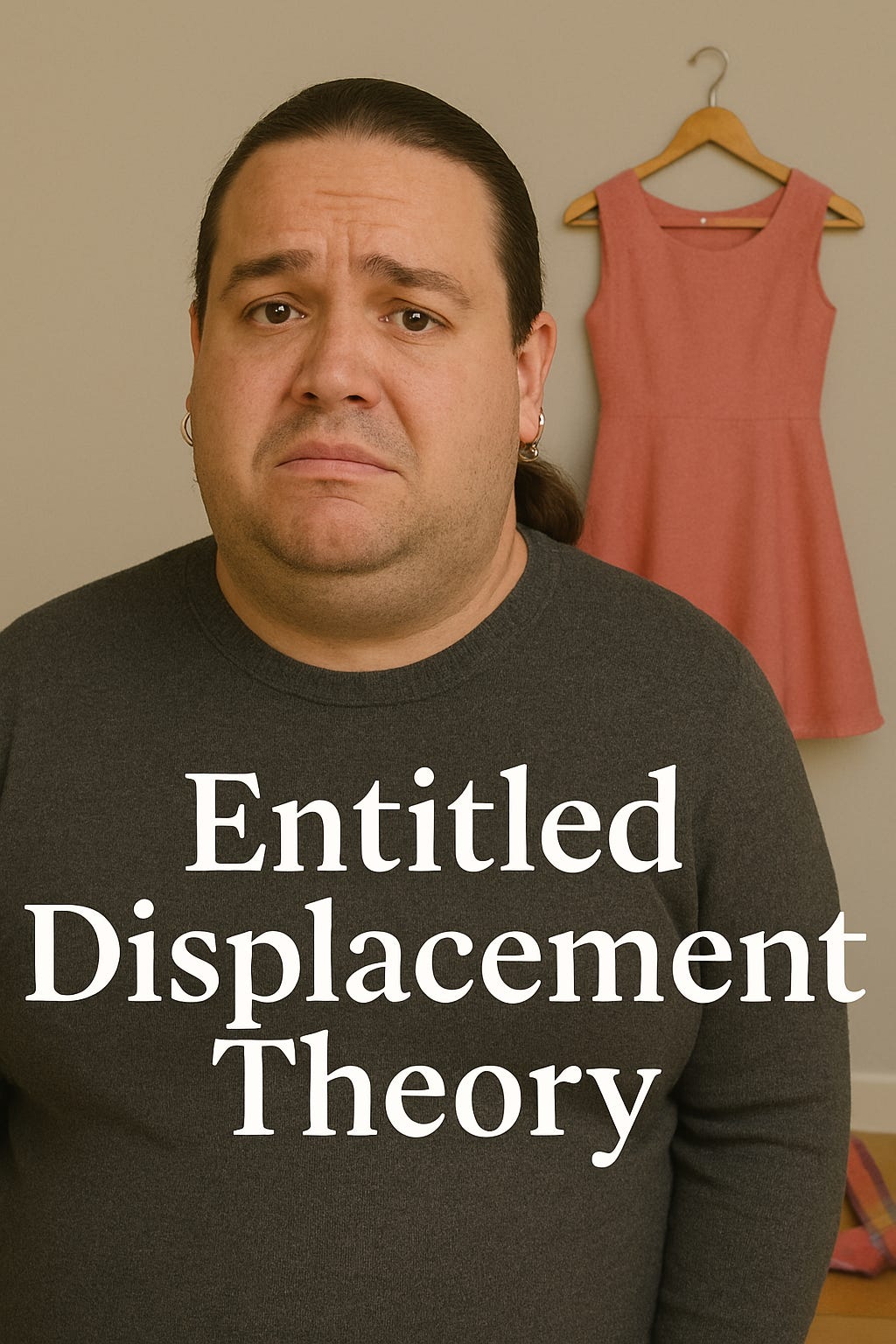Entitled Displacement Theory: How Male Narcissism and Misogyny Drive Identity Appropriation in the Post-Feminist Age
This essay introduces what I call Entitled Displacement Theory, which explores how the rise of the manosphere, incel subcultures, and autogynephilic transgender identification are interconnected sympt
As a psychotherapist, I’ve spent years helping people unpack the hidden forces shaping identity, behavior, and power. One pattern emerging with striking clarity is how some men—faced with declining social dominance and the progress of feminism—respond not with growth, but with appropriation. This isn’t just about online misogyny or resentment. It’s about a deeper, more insidious psychological pattern: Entitled Displacement.
This theory explores how the rise of the manosphere, incel subcultures, and autogynephilic identification as “trans women” are all expressions of the same root impulse—male entitlement—mutating in real time.
I believe we must talk more openly about the way many men, feeling destabilized by feminism and shifting gender norms, choose to respond not with introspection, but with appropriation.
Abstract
In the wake of decades of feminist progress, a backlash has emerged from men who feel dispossessed of traditional power. Entitled Displacement Theory links the rise of the manosphere, incel culture, and autogynephilic identification as “trans women” to a common root: male entitlement and the narcissistic response to women’s growing autonomy. These trends represent a new frontier in the colonization of womanhood, with the most extreme form being the appropriation of female identity and space under the guise of gender diversity.
1. The Collapse of Traditional Male Hierarchies
Feminism has successfully challenged structures that granted men automatic dominance—such as the primacy of the male breadwinner and the sexual double standard. For men whose identities were tethered to these systems, this cultural shift is not seen as an invitation to evolve—but as a threat to their very sense of self.
Many experience what psychologists might call status anxiety, leading to externalized rage and internal disintegration. This fuels the emergence of two responses: aggressive backlash (via the manosphere and incel movements), and identity displacement (via autogynephilic identification).
2. The Manosphere: An Online Grievance Engine
Online spaces like The Red Pill, MGTOW (Men Going Their Own Way), and PUA (Pick-Up Artist) communities provide ideological safe havens for men who believe they are victims of feminism. These spaces validate a deep entitlement to women's bodies, emotional labor, and social attention.
Common refrains include:
“Women don’t want nice guys anymore.”
“Modern women are hypergamous and selfish.”
“Feminism has destroyed family values.”
These aren’t neutral observations—they’re battle cries for reestablishing dominance, often through manipulation, withdrawal, or outright hostility. When that fails, some turn to more insidious forms of identity colonization.
3. Autogynephilia: The Fetishization of Womanhood
Autogynephilia, as defined by sexologist Ray Blanchard, refers to a man’s sexual arousal at the thought of himself as a woman. Not all trans-identifying males experience this, but many high-profile transitions—especially those fueled by online pornography and erotic fantasy—fall under this category (Blanchard, 1989).
Feminist writer Jennifer Bilek explores how this phenomenon intersects with billion-dollar industries: medical, pharmaceutical, and corporate. As she states:
“The trans movement is a top-down, corporate-driven phenomenon. It is not a grassroots civil rights movement.”
—Jennifer Bilek, The 11th Hour Blog
What’s being performed is not womanhood—but an idea of womanhood, often hyper-sexualized, infantilized, and disconnected from female experience. These are men embodying pornified fantasies of what a woman is, often rooted in fetish or narcissistic fantasy, not identity.
4. Misogyny Repackaged as Inclusion
Feminist theorists like Mary Daly, Sheila Jeffreys, and Andrea Dworkin warned us that patriarchy does not disappear—it adapts. Today, we are watching male entitlement take on new forms, dressed in the language of inclusion and progress.
Women are now expected to share:
Their sports teams,
Their rape crisis shelters,
Their prisons,
Their medical language (“menstruators,” “chestfeeders”),
Even their trauma support spaces.
“Transgenderism as a political movement is entirely dependent on the erasure of women.”
—Sheila Jeffreys, Gender Hurts
What we are witnessing is not inclusion but erasure, where female boundaries are demonized and female-only spaces become battlegrounds for male reinvasion—this time under the flag of gender identity.
5. Narcissistic Collapse and Identity Invasion
Entitled Displacement Theory identifies a phenomenon I’ve seen in practice: a narcissistic collapse that occurs when a man’s identity is no longer validated by external markers of dominance. In this collapse, some men retreat inward, reemerging not as evolved, empathetic humans—but as fetishized caricatures of women.
If I can’t own her, I’ll be her.
This is the ultimate colonization—not just of land or labor—but of identity, self-definition, and language. And it is happening under the banner of progress.
6. A Feminist Response
We must reclaim the radical power of the word no. No, women are not costumes. No, we are not ideas or projections. No, we are not required to make room for men in our identity.
Women are a material class of people, defined by biology, socialization, and centuries of resistance to male control.
“Women are not human beings to [them] but sexual beings to be owned, watched, mocked, destroyed.”
—Andrea Dworkin, Pornography: Men Possessing Women
The feminist fight of the 21st century is not just about wage gaps or reproductive rights. It’s about holding the line on what it means to be a woman—and refusing to let patriarchal narcissism redefine us out of existence.
Definition: Entitled Displacement Theory
Entitled Displacement Theory is a sociocultural and psychological framework that explains how certain men, unable to maintain dominance in a post-feminist society, respond to women’s increasing autonomy by attempting to reclaim control—either through overt misogyny (e.g., manosphere culture) or identity appropriation (e.g., autogynephilic trans identification). Rather than evolving, these men redirect their entitlement by displacing their identities onto womanhood itself, fetishizing and infiltrating it in a narcissistic effort to remain centered.
About the Author
The Radical Therapist is a licensed psychotherapist with expertise in gender, trauma, and sociocultural dynamics. She writes about the intersections of psychology, feminism, and contemporary culture





Love to hear your thoughts and experiences!